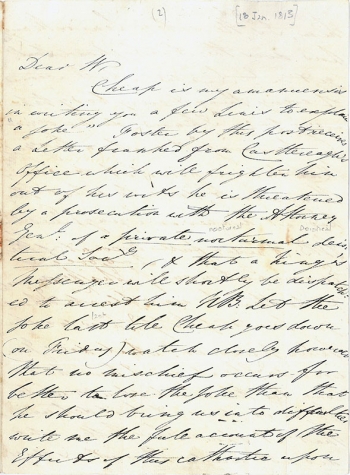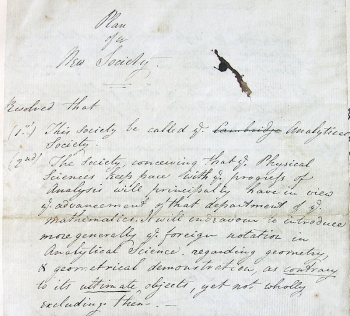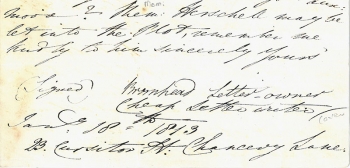What larks! or, Practical joking, mathematical style
Take a country in the throes of the Napoleonic wars and related battles of ideologies, feverish with suspicion, and you have the perfect atmosphere for convincing a friend that he’s about to be arrested as a subversive element. Such was the wheeze that the Caian Edward Thomas Ffrench Bromhead (matric. 1808) had cooked up with obvious glee for a mutual friend of his and the Johnian John William Whittaker (matric. 1810), to whom he wrote on 18 January 1813:
on 18 January 1813:
Receiving a letter franked by Castlereagh’s office would indeed appear rather serious: Robert Stewart, Viscount Castlereagh—also a Johnian—was in January 1813 newly Secretary of State for Foreign Affairs (Foreign Secretary) as well as Leader of the House of Commons. 18 January was a Monday, so Foster had the best part of the week to be in a sweat over the matter.
The sinister Society for which Foster would believe himself indictable must certainly be the Analytical Society, established to promote mathematical analysis, of which Bromhead was a founding member; Whittaker, if not a member, was clearly part of its fringe and an intimate of many of them. The ‘us’ may suggest that Bromhead’s wariness over the outcome concerned potential trouble for the Society, not merely for himself and John Cheap (Trinity, matric. 1811). Before signing off, they add a memorandum that ‘Herschell may be let into the Plot,’ meaning the mathematician and astronomer John Frederick William Herschel (St John’s, matric. 1809), a key member of the Society who had just become Senior Wrangler.
As to Foster himself—assuming that ‘Foster’ is not a misleading nickname—time permits only modest speculation rather than research. Since Whittaker was obviously an associate of Foster, he was perhaps one of the William Fosters—William of Settle or William Hamilton of Dunleer—next door at Trinity at the time, and quite likely among the ‘several others’ mentioned by Charles Babbage at the Society’s initial meeting.
A little background on the Society and some mathematical notation is needed in order to understand the joke fully:
Babbage (Trinity, matric. 1810; migrated to Peterhouse 1812) was not alone in chafing at the conservative tenor of Cambridge mathematics of the time. The University’s dogged adherence to the Newtonian system of dots (e.g., ẋ ẍ) to indicate fluxions drove him to ‘devour’ the papers of the continental mathematicians, from which he became convinced of the ‘superior power’ of the notation of Gottfried Leibniz, who employed ds (e.g., dx dy). The Leibniz-Newton calculus controversy had already rumbled on for a century; in uneasy times it would seem that even a longing for the University to adopt continental symbols for the differential calculus might be construed as disloyal, unpatriotic.
 As Babbage explained in his Passages from the Life of a Philosopher, the Analytical Society started in an idle moment as a parody of the broadsides and posters then abundant in Cambridge that were being generated by the opposing parties in a fierce controversy over whether to print the Bible with accompanying notes or without. Mimicking the ‘exaggerated tone’ of one of the posters, Babbage
As Babbage explained in his Passages from the Life of a Philosopher, the Analytical Society started in an idle moment as a parody of the broadsides and posters then abundant in Cambridge that were being generated by the opposing parties in a fierce controversy over whether to print the Bible with accompanying notes or without. Mimicking the ‘exaggerated tone’ of one of the posters, Babbage
drew up the sketch of a society to be instituted for translating the small work of Lacroix on the Differential and Integral Lacroix [Calculus]. It proposed that we should have periodical meetings for the propagation of d’s; and consigned to perdition all who supported the heresy of dots. It maintained that the work of Lacroix was so perfect that any comment was unnecessary.
His friend, Michael Slegg, also of Trinity, ‘enjoyed the joke heartily’ and showed it to his friend Edward Ffrench Bromhead, who was highly amused but added that ‘it was too good a joke to be lost, and proposed seriously that we should form a society for the cultivation of mathematics,’ and called on Babbage the next day to talk it over.
The society formed, ‘hired a meeting-room, open daily; held meetings, read papers, and discussed them. Of course we were much ridiculed by the Dons; and, not being put down, it was darkly hinted that we were young infidels, and that no good would come of us.’
‘Deistical’ in the letter is a play on the d notation; Babbage echoes this in Passages, writing that when the Memoirs of the Analytical Society were published later in 1813:
At last our work was printed, and it became necessary to decide upon a title. Recalling the slight imputation which had been made upon our faith, I suggested that the most appropriate title would be—The Principles of pure D-ism in opposition to the Dot-age of the University.
And what in the end was the effect of the prank on Foster? Answers on Foreign and Commonwealth Office stationery, please.
-------------------------------------------------------------------------
The letter from Edward Ffrench Bromhead to John William Whittaker, ref. SJC Library/Whittaker/7/2, is one of a rollicking batch amongst Whittaker’s papers held in the Old Library. The pencilled transcription efforts (not always successful) are those of a previous owner.
The plan of the Analytical Society is tipped into Babbage’s own copy of Memoirs of the Analytical Society, 1813, classmark 6.15.63.
Quotations from Charles Babbage are from his Passages from the Life of a Philosopher (London: Longman, Green, Longman, Roberts & Green, 1864), pp.27-29.
This Special Collections Spotlight article was contributed on 8 April 2014 by M. Marvin, Manuscripts Cataloguer, who begs to be excused from answering any mathematical questions.